List of hamburgers
Appearance
(Redirected from Kimchi burger)

This is a list of notable hamburgers. A hamburger consists of a cooked patty of ground meat usually placed between two slices of a bread roll. Hamburgers are often served with lettuce, bacon, tomato, onion, pickles, cheese, and condiments such as mustard, mayonnaise, ketchup, and relish.[1] There are many types of regional hamburgers with significant variations.
Hamburgers
[edit]| Name | Image | Origin | Description |
|---|---|---|---|
| 50/50 burger |  |
California, United States | Half ground bacon, half ground beef burger patty developed by Scott Slater for Slater's 50/50 restaurant. Another variety is half kangaroo meat and half bacon. |
| Angus burger |  |
Aberdeen Angus cattle originate in the counties of Aberdeenshire and Angus in Scotland[2] | A hamburger made using beef from Angus cattle. The name "Angus burger" is used by several fast-food hamburger chains for one or more "premium" burgers; however, it does not belong to any single company. Pre-made frozen Angus burgers are increasingly available from retailers. |
| Aussie burger/Kiwiburger |  |
Australasia | Popular regional hamburger ingredients in Australia and New Zealand include canned beetroot, pineapple and a fried egg.[3][4][5] Pictured is a burger with slices of canned beetroot within it. |
| Bacon cheeseburger |  |
An A&W Restaurants store in Lansing, Michigan in 1963 | Hamburger with bacon and cheese is a bacon cheeseburger, which became an official menu item at an A&W Restaurant owned by Dale Mulder in Lansing, Michigan, in 1963.[6][7] Hamburgers with bacon but no cheese may be referred to as bacon burgers. |
| Banquet burger | Toronto, Canada | Cookbook author Kathleen Sloan-McIntosh credits Francis Deck as the inventor of this burger, stating its original name was the Forest Hill burger. Similar to a bacon cheeseburger, this burger is often served open-faced, with the hamburger patty, cheese, and bacon on a flat bottom bun next to the top rounded bun containing the lettuce, tomato, and onion slices. The ground beef contains black pepper, Worcestershire sauce, and grated onion. Condiments used are mayonnaise, mustard, ketchup, and dill pickles.[8] | |
| Bøfsandwich |  |
Denmark | Classic Danish take on a hamburger.[9] It contains the hamburger elements of a cooked ground beef patty placed inside a sliced bread roll. Bøfsandwiches are traditionally sold from hotdog stands and other fast food establishments, but some traditional Danish restaurants have started serving gourmet versions. |
| Butter burger |  |
Most likely first served in 1936 at Solly's Grille in Milwaukee | In the Upper Midwest, particularly Wisconsin, burgers are often made with a buttered bun, butter as one of the ingredients of the patty or with a pat of butter on top of the burger patty.[10] |
| Buffalo burger |  |
New York | Prepared with meat from the American bison,[11] buffalo burgers have less cholesterol, less fat, and fewer calories than beef hamburgers and chicken hamburgers. The American Heart Association recommended buffalo burgers in 1997 as more heart-healthy than chicken or beef.[12] |
| California burger | 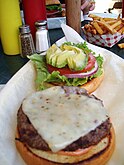 |
California | In the Western U.S., a "California" burger most often consists of a normal cheeseburger, with the addition of bacon and either guacamole or avocado.[10] In the Eastern U.S., a California burger is traditionally a burger with lettuce, tomato, and raw onion.[13][14] |
| Carolina burger |  |
North Carolina, United States | In portions of the Carolinas, a Carolina-style hamburger "with everything" may be served with cheese, chili, onions, mustard, and cole slaw.[15] Common in local restaurants in the Carolinas, it is also periodically offered at Wendy's restaurants as the Carolina Classic.[16] |
| Cheeseburger | 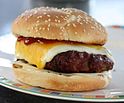 |
United States | Hamburger accompanied with melted cheese. The term itself is a portmanteau of the words "cheese" and "hamburger". The cheese is usually sliced, then added a short time before the hamburger finishes cooking to allow it to melt. In fast food restaurants, the cheese that is added to a cheeseburger is typically American cheese, but there are many other variations. Mozzarella, blue cheese, Swiss cheese, pepper jack, and especially cheddar are popular choices. |
| Chili burger |  |
Thomas M. "Ptomaine Tommy" DeForest appears to have developed the chili burger in the 1920s[17] | Consists of a hamburger, with the patty topped with chili con carne[18][19][20] |
| Chori burger |  |
Merly's BBQ, a street food stall in Boracay, Philippines | A Filipino hamburger characteristically made with chorizo (longganisa) patties, banana ketchup, mayonnaise, and atchara, in addition to tomatoes and lettuce. It was first popularized by Merly's BBQ, a street food stall in the island of Boracay in the Philippines.[21] |
| Coconut burger | Philippines | Also known as sapal burger or niyog burger, this is a Filipino veggie burger made with shredded coconut pulp (sapal), which are the by-products of traditional coconut milk extraction in Filipino cuisine.[22] | |
| Fat Boy | Greek burger restaurants in Winnipeg, Manitoba, in the 1950s. | The Fat Boy commonly consists of one or more patties, topped with a distinct chili sauce, quartered dill pickles, tomatoes, lettuce and a large amount of mayonnaise and mustard with fresh-cut fries. | |
| Green chile burger |  |
Historical creator is unclear; both the Owl Bar & Grill and the Buckhorn Tavern in San Antonio, New Mexico, were serving them circa 1945[23] | Burger topped with roasted New Mexico green chiles. Many places around New Mexico serve variations of this burger.[24][25] |
| Guber burger |  |
The Wheel Inn Drive-In in Sedalia, Missouri | Burger topped with peanut butter[26][25] |
| Hamdog | Invented in 2004 by Australian Mark Murray and patented in 2009. The Hamdog received global media recognition in late 2016 as the world's only patented and trademarked burger. | Australian invention that consists of a special combination hamburger and hotdog bun. A meat patty is split in half and has a sausage run through the middle. It is then topped just as a conventional burger. | |
| Jucy Lucy |  |
Two bars on the same street in South Minneapolis both claim to have invented the sandwich: Matt's Bar and the 5-8 Club.[27] | A cheeseburger that has the cheese inside the meat patty rather than on top. A piece of cheese is surrounded by raw meat and cooked until it melts, resulting in a molten core of cheese within the patty. |
| Kimchi burger | 
|
It has been stated that Uncle Joe's Hamburger of Seoul, South Korea, was the inventor of the kimchi burger[28][29] | A hamburger that includes kimchi in its preparation[30] |
| Luther Burger |  |
The origin is disputed. According to legend, the burger was named for and was a favorite (and possible invention) of singer, songwriter and record producer Luther Vandross.[31] The Daily Telegraph reported that Mulligan's, a suburban bar in Decatur, Georgia, may be progenitor of the burger when the owner substituted the doughnuts when running out of buns.[31][32] | Hamburger or cheeseburger prepared with one or more glazed doughnuts in place of the bun |
| Oklahoma onion burger |  |
Oklahoma, United States | A burger with a large amount of thinly sliced onions piled on top of the ground beef before smashing the patty into the grill to embed the onions in the beef. It was conceived of during The Great Depression in Western Oklahoma as a way for local diners to stretch ground beef.[33] |
| Olive burger |  |
Lansing, Michigan | A burger topped with "olive sauce", a mixture of chopped green olives and mayonnaise. Most likely originating at Weston's Kewpee Sandwich Shop in the 1920s,[34] olive burgers are a popular local fast food burger in the Lansing metropolitan area.[25] |
| Pastrami burger |  |
Popularized by Crown Burgers of Utah in 1978. | A burger with cheese and thin-sliced pastrami on top,[10] commonly served at Greek burger restaurants in Utah.[35] |
| Patty melt |  |
United States |
Hamburger sandwich consisting of a ground beef patty, pieces of sautéed or grilled onion and Cheddar or Swiss cheese between two slices of bread (traditionally rye, though sourdough is sometimes substituted). |
| Rice burger | 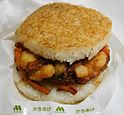 |
Created in Japan by MOS Burger | Style of hamburger in which the bun is a compressed cake of rice.[36] The MOS Burger fast-food restaurant chain introduced the rice burger in 1987,[37][38] and it has since become a popular food item in East Asia. |
| Salmon burger |  |
United States | Fishcake made mostly from salmon in the style of a hamburger. Salmon burgers are especially common in Alaska where they are routinely offered as an alternative to beef hamburgers.[39] |
| Slider |  |
According to the earliest citations, the name originated aboard U.S. Navy ships, due to the way greasy burgers slid across the galley grill while the ship pitched and rolled.[40][41] Other versions claim the term "slider" originated from the hamburgers served by flight line galleys at military airfields, which were so greasy they slid right through one; or because their small size allows them to "slide" right down the throat in one or two bites. White Castle trademarked the spelling variant "Slyder" and used it between 1985 and 2009.[42] | Primarily refers to small hamburgers, but can also cover any small sandwich served on a slider roll |
| Slopper |  |
The slopper originated in 1965 or earlier in Pueblo, Colorado; however, the exact restaurant is disputed.[43] Some say that it was created at Coors Tavern while others argue that it originated at Star Bar.[43] | Cheeseburger or hamburger served open-faced and smothered in red chile, or green chile (aka chile verde or green chile sauce). Sloppers generally include grilled buns and are often topped with freshly chopped onions. Eating a slopper is no easy task. The use of a fork or spoon is essential, but a fork and knife, or fork and spoon combination is recommended. |
| Slugburger | 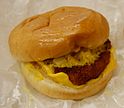 |
Northeast Mississippi | Traditional southern delicacy found in northeast Mississippi, particularly Booneville and Corinth. The original recipe was made to help people extend their beef supply, by adding stale bread crumbs to the beef. The name comes from the burger originally costing 5¢, or a nickel (a "slug"). Today, a slugburger is a patty made from a mixture of beef or pork and an inexpensive extender such as soybeans or soy flour, it is deep fried in oil.[10] It is typically served on a bun with mustard, pickles, onion, and in some places with a side of French fries. |
| Steak burger | 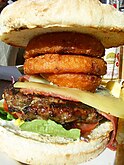 |
United States | Typically prepared with ground, sliced or minced beefsteak meat. Additional meats are also used. |
| Steamed cheeseburger |  |
Mainly available in central Connecticut. It is believed to have been invented at a restaurant called Jack's Lunch in Middletown, Connecticut in the 1930s. | Instead of being fried in a pan or grilled on a grill, a steamed cheeseburger is steamed in a stainless-steel cabinet containing trays that hold either a hamburger patty or a piece of cheese. This method of cooking makes the fats in the meat melt away, resulting in a moist, juicy burger which is then put on a bun and covered with the melted cheese. Various customary toppings can then be added to the burger.[44] |
| Tempeh burger |  |
Indonesia | Vegetarian hamburger variant with tempeh (Indonesian fermented soybean cakes) as its main ingredient. |
| Teriyaki burger |  |
According to George Motz, the burger has Japanese origins. It is popular in Hawaii.[25] | Teriyaki burger (テリヤキバーガー) refers to a variety of hamburger either topped with teriyaki sauce or with the sauce worked into the ground meat patty.[25] |
| Veggie burger | 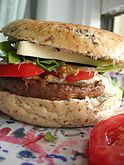 |
United States, Canada, Mexico | Veggie burger, garden burger, or tofu burger uses a meat analogue, a meat substitute such as tofu, textured vegetable protein, seitan (wheat gluten), Quorn, beans, grains or an assortment of vegetables, which are ground up and formed into patties. |
See also
[edit]- History of the hamburger
- History of the hamburger in the United States
- Hot dog variations
- List of beef dishes
- List of hamburger restaurants
- List of sandwiches
- List of steak dishes
References
[edit]- ^ Cooking wizardry for kids, Margaret Kenda, Kenda & Williams, Phyllis S. Williams, Contributor Phyllis S. Williams, Barron's Educational Series, 1990 ISBN 0-8120-4409-6, ISBN 978-0-8120-4409-6 page 113 [1]
- ^ Encyclopædia Britannica 15th Ed. Vol.10 p.1280
- ^ "Fed: Tough to swallow inflationary hamburgers". Australian Associated Press General News. Australian Associated Press. 2006-07-26.
- ^ Hay, Donna (2002-11-24). "The new burger". Sunday Herald Sun. The Herald and Weekly Times.
- ^ "The Aussie Burger". Woolworths Group Limited. 1997–2018. Retrieved August 6, 2018.
- ^ Schneider, Jason (June 22, 2015). "14 things you didn't know about A&W restaurants". Thrillist. Retrieved May 18, 2017.
- ^ Capella, Abby (February 1, 2016). "How the American hamburger has evolved over the years". Spoon University. Retrieved May 18, 2017.
- ^ Sloan-McIntosh, Kathleen (2007). 100 Best Grilling Recipes: BBQ Food from Around the World. Robert Rose. ISBN 978-0778801597., reprinted at Sloan-McIntosh, Kathleen (23 February 2016). "The Great Canadian Banquet Burger". Cookstr. Retrieved 15 August 2021.
- ^ (in Danish) Gastromands nytårskur: Bøfsandwich med SOVS | Gastromand.dk
- ^ a b c d Lapetina, Adam (August 10, 2014). "The 16 essential regional burger styles in America". thrillist. Retrieved February 5, 2015.
- ^ Sheridan, Dick (15 June 1999). "Buffalo Meat Makes Comeback". Daily News. New York. Retrieved 25 November 2011.
- ^ Duffy, Gillian (June 23–30, 1997). "Where's The Beef?". New York: 99. Retrieved 25 November 2011.
- ^ "BURGER HOT DOGS CHEESESTEAKS CHICKEN SANDWICHES – Galloping Hot Dogs". www.gallopinghotdogs.com. Archived from the original on 2016-04-03.
- ^ "Ever Heard of a California Cheeseburger?". 16 August 2019.
- ^ Murrell, Duncan (June 2011). "Burger, with Everything". Our State. Retrieved December 7, 2012.
- ^ "Wendy's Brings Back a Regional Classic". Herald-Journal. February 12, 2006. Retrieved December 7, 2012.
- ^ Grace, Roger. "Old Menus Tell the History of Hamburgers in L.A." Metropolitan News-Enterprise. Retrieved 1 September 2015.
- ^ Butel, Jane (2008). Chili Madness: A Passionate Cookbook. Workman. p. 103. ISBN 9780761147619. Retrieved December 4, 2012.
- ^ Shopsin, Kenny; Carreño, Carolynn (2008). Eat Me: The Food and Philosophy of Kenny Shopsin. Random House. pp. 167–. ISBN 9780307264930. Retrieved December 4, 2012.
- ^ Sauceman, Fred William. The Place Setting: Timeless Tastes of the Mountain South, p. 148-49 (2006)
- ^ "Chori Burger (New York's Best Burger)". Jeepney Recipes. Archived from the original on 25 March 2019. Retrieved 25 March 2019.
- ^ "Niyog/ Sapal Burger (Meatless Coconut Burger) with Spicy Teriyaki Sauce". Pinoy Kusinero. Archived from the original on 2015-12-28.
- ^ "Bite into the History of the Green Chile Cheeseburger". 4 May 2022.
- ^ "New Mexico Green Chile Cheeseburger Trail | New Mexico True".
- ^ a b c d e Motz, George; Zimmern, Andrew; Brearton, Kristoffer; Young, Douglas (2016). The great American burger book: how to make authentic regional hamburgers at home. New York: Stewart, Tabori & Chang. ISBN 978-1-61769-182-9. OCLC 921863985.
- ^ Tomsky, Naomi (22 January 2020). "What the Heck Is a Missouri Guber Burger?". The Kitchn. Retrieved 8 July 2024.
- ^ Jay Boller & Justin Flower, Burger Battle Archived 2009-07-10 at the Wayback Machine Minnesota Daily, March 2008.
- ^ Ritzer, G. (2011). The McDonaldization of Society 6. SAGE Publications. p. 202. ISBN 978-1-4129-8012-8. Retrieved October 1, 2015.
- ^ Ritzer, George; Malone, Elizabeth L. (Summer–Fall 2000). "Globalization Theory: Lessons from the Exportation of McDonaldization and the New Means of Consumption". American Studies. 41 (2–3): 97–118. JSTOR 40643232.
In Seoul, competitors to McDonald's include Americana and Uncle Joe's Hamburger (the inventor of the kimchi burger featuring an important local condiment - spicy pickled cabbage). ...
(subscription required) - ^ The Burger: An Action-Packed Tasty Adventure. Parragon Books. 2014. p. 139. ISBN 978-1-78186-242-1.
- ^ a b Mikkelson, Barbara; Mikkelson, David P. (2005-03-03). "Luther Burger". Urban Legends Reference Pages. San Fernando Valley, California, United States. Archived from the original on 2022-06-10. Retrieved 2010-10-19.
- ^ Leonard, Tom (2009-10-06). "Craz-E Burger: Americans embrace 1,500 calorie doughnut burger". The Daily Telegraph. London, England, UK. ISSN 0307-1235. OCLC 49632006. Archived from the original on 2013-05-05. Retrieved 2010-10-30.
Calorie-comfortable Americans have found the perfect rejoinder to the healthy eating lobby - the doughnut burger.
- ^ Maria Yogada, "The Oklahoma Onion Burger is a National Treasure" From Food and Wine https://www.foodandwine.com/news/oklahoma-onion-burger-national-treasure
- ^ Hansen, Haley (August 1, 2019). "'Quintessential Lansing': How mid-Michigan grew to love the olive burger". Lansing State Journal.
- ^ Pugh, Jeremy (2022-07-06). "Utah Field Guide: The Pastrami Burger". Salt Lake Magazine. Retrieved 2022-09-15.
- ^ Food on the Move: Proceedings of the Oxford Symposium on Food and Cookery, 1996 - Google Books
- ^ Matthew Amster-Burton, "Rice Burgers: The Ultimate Fast Food", Gourmet, December 11, 2008.
- ^ Pradyumna Karan, Japan in the 21st Century: Environment, Economy, and Society (University Press of Kentucky, 2010), ISBN 978-0813127637, p. 229. Excerpts available at Google Books.
- ^ Jim DuFresne; Greg Benchwick; Catherine Bodry (2009), Alaska, Lonely Planet Publications, ISBN 978-1-74104-762-2
- ^ Slider or Slyder (mini-hamburger). Barry Popik, February 14, 2008.
- ^ Keith Plocek (February 21, 2008). Sliders, Rollers and Monkey Dicks Archived 2008-03-16 at the Wayback Machine. Houston Press.
- ^ "US Trademark #74384698". United States Patent and Trademark Office. Retrieved 7 June 2010.
IC 030. US 046. G & S: prepared sandwiches for consumption on or off the premises. FIRST USE: 1993-03-14. FIRST USE IN COMMERCE: 1993-03-14
- ^ "In Connecticut, Steamed Cheeseburger is King". 21 June 2012.
External links
[edit] Media related to Hamburgers at Wikimedia Commons
Media related to Hamburgers at Wikimedia Commons

